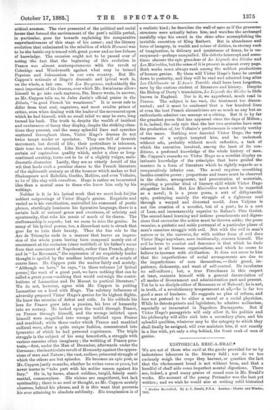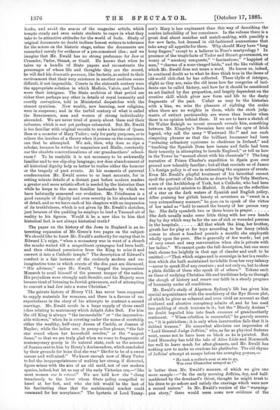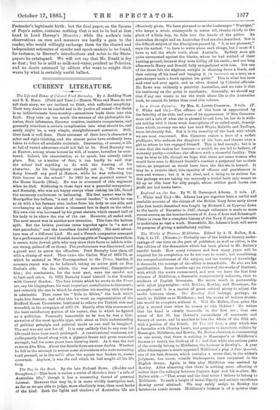HISTORICAL BRIC-A-BRAC.* WE are not of those who cavil at
the goods provided for us by industrious labourers in the literary field ; nor do we too curiously weigh the crops they harvest, or question the fact that the wholesomest bread is not without bran, and that a handful of chaff aids some imperfect mental digestions. There are, indeed, a good many grains of sound corn in Mr. Ewald's works. His account of the young Pretender was the best yet written ; and we wish lie would aim at writing solid historical
• Studies Re-studied. 13y A. C. Ewald, F.S.A. London : Chat° and Windt's.
books, and avoid the snares of the magazine article, which tempts steady and even sedate students to caper in what they take to be attractive attitudes for the world of fools. Study of original documents no doubt inclines honest writers to tolerance for the actors on the historic stage, unless the documents are ransacked merely for evidence of a pre-conceived idea ; and we imagine that Mr. Ewald has no strong preference for Jew or Crusader, Tudor, Stuart, or Guelf. He knows that when he takes up a bundle of State papers and reconstructs the personages of whose life and thoughts they are the record, he will find his dramatis persons, like bacteria, so suited to their environment that their very existence in another medium seems difficult, if not impossible. Courts in the sixteenth century were the appropriate solution in which Medicis, Valois, and Tudors wove their intrigues. The State archives of that period are richer than perhaps any other in details of royal humanity and courtly corruption, told in Ministerial despatches with the utmost cynicism. New wealth, new learning, new religions, were in suspense; and in the turbid century of what is called the Renaissance, men and women of strong iudividuality abounded. We are never tired of gossip about them and their influence, which is not yet perhaps exhausted. But Mr. Ewald is too familiar with original records to make a heroine of Queen Bess or a monster of Mary Tudor ; only for party purposes, or to relieve the incubus of a theory when it presses on the conscience, can that be attempted. We ask, then, why does so ripe a scholar, because he writes for magazines and Mudie, constantly use the obsolete conventionalisms of our grandmothers' school- room ? To be readable it is not necessary to be awkwardly familiar and to use slip-slop language; nor does abandonment of all historical dignity help us better to realise either the humour or the tragedy of past events. At his moments of paternal condescension Mr. Ewald seems to na least accurate, for in setting minute details of a distant past before modern readers a greater and more artistic effort is needed by the historian than while he keeps to the more familiar landmarks by which we have habitually measured our evolution. Mr. Friedmann is a good example of dignity and even severity in his abundant use of detail, and so we leave each of his chapters with an impression of its truthfulness, which is not given by Mr. Ewald's sketches, just because of the padding he employs to lend a Tassand air of reality to his figures. Would it be a new idea to him that historical fact is not always historical truth?
The paper on the history of the Jews in England is an in- teresting expansion of Mr. Green's two pages on the subject. We should like to know Mr. Ewald's authority for saying that in Edward L's reign, "when a monastery was in want of a church the monks waited till a magnificent synagogue had been built, and then obtained permission from the King to seize it and convert it into a Catholic temple." The description of Edward's conduct is a fair instance of the curiously modern and un- imaginative tone in which events of the dim past are discussed. -" His advisers," says Mr. Ewald, "begged the impecunious Monarch to avail himself of the present temper of the nation. His prejudices were strongly anti-Semitic, and his Majesty soon became tired of listening to Jewish grievances, and of attempting to convert a bad Jew into a worse Christian."
The private history of Henry VII. has never been supposed to supply materials for romance, and there is a flavour of un- expectedness in the story of his attempts to contract a second marriage. Mr. Ewald revels in a large supply of those small jokes relating to matrimony which delight John Bull. For him the old King is always "the inconsolable" or "the impression- able widower," when he is coveting under the name of courtship either the wealthy, half-crazy Juana of Castile, or Joanna of Naples ; while the ladies are, in penny-a-line phrase, "the fair star round whom her household revolve," or the "august dame," so that we are truly glad when we come to fragments of contemporary gossip in its natural state, such as the account of Joanna sent to him by Henry's Ambassadors, which concluded by their grounds for hope that she was" like for to be of a sweet savour and well-aired." We know enough now of Mary Tudor to feel the inappropriateness of making her strong, if distorted, figure mince with the airs of an old maid, not of our modern species, indeed, but let us say of the early Victorian era,—" like most women sur is retour." We are told how she "clung tenaciously to the lover whom State policy compelled to kneel at her feet, and who she felt would be the last of his fascinating class that the matrimonial market could command for her acceptance." The hysteria of Lord Tenny-
son's Mary is less unpleasant than this way of describing the sombre inflexibility of her conscience. In the volume there is a great deal about matches and match-making, with possibly a few new facts, but dressed in old-fashioned mannerisms that take away all appetite for them. Why should Mary have "long bony fingers," except to a believer in Foxe's martyrology ? In. presence of the tragic facts of Tudor and Stuart government, we weary of "amatory conquests," "fascinations," "happiest of men," "charms of a sour-visaged bride," and the like rubbish of which Mr. Ewald does not mean a word. He leaves us, indeed, in continual doubt as to what he does think true in the items of old-world chit-chat he has collected. These idylls of intrigue, slight as they are, raise the old issue how far congeries of inci- dents can be called history, and how far it should be considered an art limited by due proportion, and largely dependent on the creative skill which gives new form and life to the dusty fragments of the past. Unfair as may be the historian with a bias, we miss the pleasure of righting the scales when there are no weights in them, while the stock judg- ments of extinct partisanship are worse than lumber when there is no opinion behind them. If we are to have a sketch of Sir Walter Raleigh as recent research reveals him, something between Mr. Kingsley's Devonian hero and the ogre of Irish legend, why call the essay "Westward Ho !" and use such simpering phrases as that the brilliant buccaneer had been "reducing refractory squireens to obedience in Ireland," and "teaching the Spanish Dons how insane and futile had been their temerity in attempting to invade England," or tell us how in the Tower he "messed about with his chemicals" ? The long narrative of Prince Charles's expedition to Spain goes over ground now tolerably familiar ; but all that reminds us of James I.'s foreign policy is of use in estimating the sequence of events. Even Mr. Ewald's playful treatment of his betrothal cannot spoil the portrait of the Infanta as drawn by Sir Toby Matthew, a son of the Archbishop of York, but a Catholic, who had been sent on a special mission to Madrid. It shines as the reflection of a star on the dark waters of Spanish and English policy. After praising her girlish beauty at seventeen as "sweet in a very extraordinary manner," he goes on to speak of the virtue of her mind as "held to• exceed the beauty of her person very far. She daily spendeth two or three hours in prayer She doth usually make some little thing with her own hands day by day which may be for the use of sick or wounded persons in the hospitals All that which the king, her brother, giveth her for play or for toys according to her fancy (which comes to about a hundred pounds a month) she employeth wholly upon the poor. She is generally of few words ; but yet of very sweet and easy conversation when she is private with her ladies." We cannot quote the full description, but one more trait shines too brightly in that age of slander and craft to be omitted :—" That which reigns and is sovereign in her is a resolu- tion which she hath maintained inviolable from her very infancy —never to speak ill of any creature ; and not only so, but to show a plain dislike of them who speak ill of others." Tokens such as these of undying Christian life and traditions help us through the slough of history and renew our faith in a steady progress of humanity under all conditions.
Mr. Ewald's study of Algernon Sydney's life has given him special acquaintance with the machinery of the Rye House plot, of which be gives as coherent and even vivid an account as that confused and abortive conspiracy admits of, and he has used less padding of stock truisms in it ; but the "Bloody Assizes" no doubt beguiled him into fresh excesses of grandmotherly sentiment. "When rebellion is successful," he gravely assures us, "it is patriotism ; it is only when insurrection fails that it is dubbed treason." He somewhat alleviates our impression of "Lord General Judge Jeffries," who, as far as physical features went, seems not to have been so black as be is painted. But Lord Macaulay has told the tale of Alice Lisle and Monmouth too well to leave mach for after-gleaners, and Mr. Ewald has nothing new to make us condone his platitudes. The old rhyme of Jeffries' attempt at escape before the avenging powers,— "He took a collier's coat at sea to go, -
Was ever Chancellor arrayed so ?"
is better than Mr. Ewald's manner, of which we give one more sample :—" In the early morning Jeffries, dry, and half- maddened by the drunkard's thirst, thought he might trust to his dress to go ashore and satisfy the cravings which were now a second nature." In Mr. Ewald's version of the "warming- pan story," there would seem some new evidence of the
Pretender's legitimate birth ; but the final paper, on the Sporn.a of Pope's satire, contains nothing that is not to be had at first hand in Lord Hervey's Memoirs; while the author's trite observations on men and manners are hardly a gain to the reader, who would willingly exchange them for the shrewd and independent estimates of epochs and epoch-makers to be found, for instance, in Brewer's introductions and notes to the State. papers he catalogued. We will not say that Mr. Ewald is dry as dust ; but he is mild as milk-and-water, prudent as Polonins, and no doubt esteemed by editors who want to weight their wares by what is certainly useful ballast.




































 Previous page
Previous page